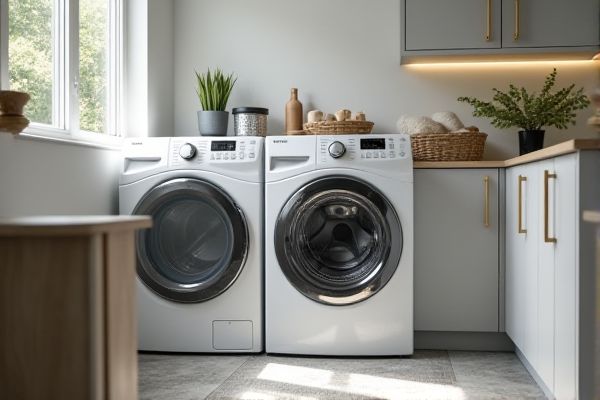
Choosing between a compact washer and a full-size washer depends on your available space and laundry needs, with compact models offering space-saving convenience and full-size washers providing larger load capacity and more features. Discover which washer fits your lifestyle best by reading the rest of the article.
Table of Comparison
| Feature | Compact Washer | Full-Size Washer |
|---|---|---|
| Dimensions | 24 inches wide or less | 27 inches or wider |
| Capacity | 1.5 to 2.3 cubic feet | 3.5 to 5.0 cubic feet |
| Ideal For | Small spaces, apartments, singles/couples | Families, large laundry loads |
| Water Usage | Less water per load | More water per load |
| Energy Efficiency | Often ENERGY STAR(r) certified | Varies, many ENERGY STAR(r) models |
| Price Range | $500 - $1,200 | $700 - $1,500+ |
| Installation Options | Stackable or freestanding | Freestanding, large variety |
| Cycle Time | Shorter cycles, efficient | Longer cycles, handles bigger loads |
Overview of Compact vs Full-Size Washers
Compact washers offer space-saving convenience ideal for small apartments or limited laundry areas, typically featuring a capacity of 1.5 to 2.5 cubic feet. Full-size washers provide larger capacities, often exceeding 4 cubic feet, accommodating bigger loads and bulky items like comforters and blankets. Your choice depends on available space, laundry volume, and specific washing needs.
Size and Space Requirements
Compact washers measure approximately 24 inches wide and fit easily into small spaces like apartments or closets, making them ideal for limited laundry areas. Full-size washers typically range from 27 to 30 inches in width and need a dedicated laundry room or larger space to accommodate their capacity and dimensions. Choosing a compact washer maximizes your available space without sacrificing essential functionality.
Washing Capacity Comparison
Compact washers typically offer a washing capacity of 1.5 to 2.5 cubic feet, making them ideal for small households or limited spaces. Full-size washers generally provide 3.5 to 5.0 cubic feet of capacity, accommodating larger loads and bulky items like bedding effectively. Choosing a washer depends on laundry volume needs, with full-size models suited for heavy usage and compact models designed for efficiency in smaller living environments.
Energy and Water Efficiency
Compact washers typically consume less water and energy per cycle compared to full-size washers, making them ideal for small households or apartments aiming to reduce utility bills. While full-size washers handle larger loads, their Energy Star-certified models are designed to optimize water usage and minimize electricity consumption, benefiting bigger families with frequent laundry needs. Choosing the right washer depends on your household size and efficiency priorities to balance performance with sustainable resource use.
Performance and Cleaning Power
Compact washers deliver efficient cleaning performance tailored for small loads, utilizing high-speed spin cycles to extract more water and reduce drying time. Full-size washers offer superior cleaning power with larger drum capacities and advanced wash cycles, effectively handling bulky items and heavily soiled laundry. Both types provide energy-efficient options, but full-size models generally excel in performance for extensive household laundry needs.
Installation Flexibility
Compact washers offer superior installation flexibility due to their smaller size, making them ideal for tight spaces such as apartments or small laundry rooms. Full-size washers require more space and dedicated hookups, limiting placement options in your home. Choosing a compact model ensures easier integration into various layouts without sacrificing essential laundry functions.
Noise Levels and Vibration
Compact washers generally produce lower noise levels and less vibration compared to full-size washers due to their smaller drums and reduced motor power, making them ideal for apartments or shared living spaces. Full-size washers, with larger drums and more powerful motors, tend to generate higher noise and vibration during heavy cycles but often include advanced suspension systems to minimize these effects. Your choice should consider the washing environment and tolerance for noise, especially if laundry appliances are placed near living or sleeping areas.
Cost and Long-Term Value
Compact washers typically have a lower upfront cost, making them an affordable choice for small spaces or budget-conscious buyers, while full-size washers often come with higher price tags due to increased capacity and features. Despite the initial savings, full-size washers tend to offer better long-term value through greater efficiency, durability, and the ability to handle larger loads, reducing the frequency of laundry cycles and energy consumption. Investing in a full-size washer can lead to lower overall operating costs and enhanced convenience over time compared to compact models.
Ideal Users and Use Cases
Compact washers suit individuals or households with limited space, such as apartment dwellers or those in small homes, offering efficient laundry solutions without compromising functionality. Full-size washers are ideal for larger families or users with frequent, high-volume laundry needs, providing greater capacity and faster wash cycles. Your choice depends on balancing available space and laundry demands to optimize convenience and efficiency.
Pros and Cons Summary
Compact washers save space and are energy-efficient, making them ideal for small apartments or limited laundry areas. Full-size washers handle larger loads, reducing washing time and better accommodating big families but require more space and higher water usage. Your choice depends on balancing space constraints with laundry volume needs.
 homyna.com
homyna.com